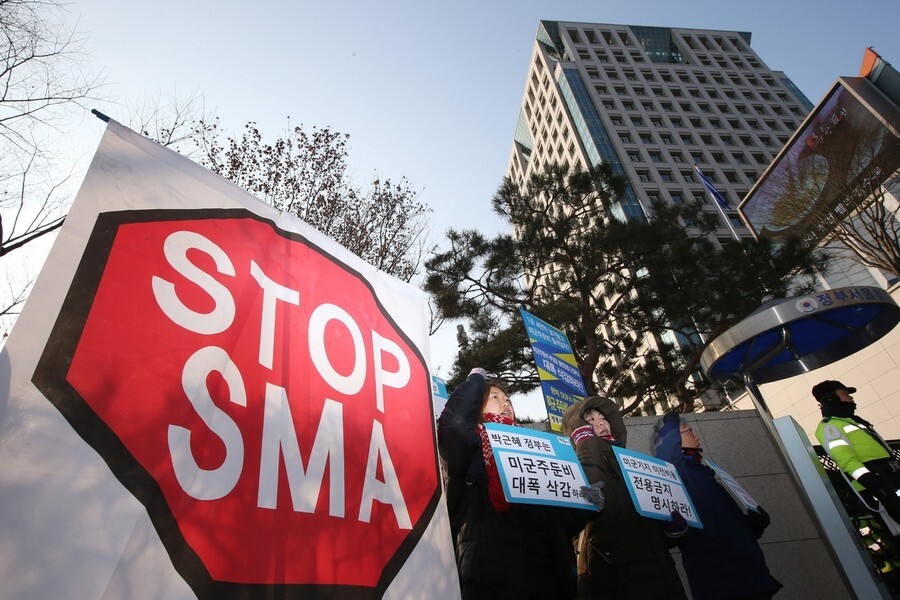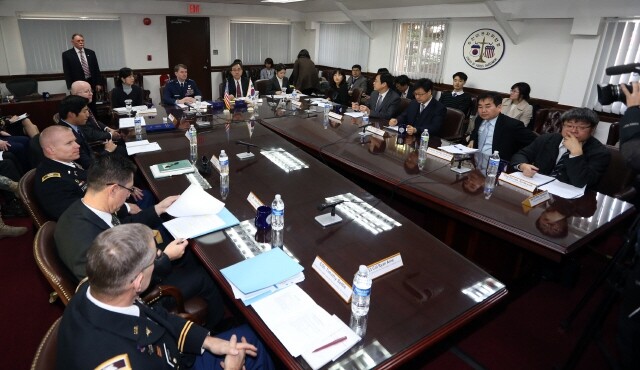hankyoreh
Links to other country sites 다른 나라 사이트 링크
US Forces Korea got $59.4 million in tax breaks over the last five years

US Forces Korea had at least 67.6 billion won (US$59.4 million) in local taxes waived by Gyeonggi Province and Seoul in the last five years, it was recently learned.
From 2012 to 2016, USFK received 14.4 billion won (US$12.6 million) in property tax, vehicle tax, and regional educational tax exemptions from Seoul Metropolitan Government. The estimable portion of the USFK local taxes waived by Gyeonggi Province over the same time comes out to around 53.2 billion won (US$46.7 million). Since that amount does not include automobile taxes, which account for a large portion of Gyeonggi’s local tax revenue, the actual tax breaks are almost certainly much larger.
The details came from an analysis of USFK indirect cost support based on data acquired over the past month from Justice Party lawmaker and National Assembly National Defense Committee member Kim Jong-dae and the Hankyoreh’s own investigation.
South Korean support for USFK costs comes in two types, direct and indirect. To begin with, USFK receives a certain amount in cash and in kind each year in accordance with the Special Measures Agreement (SMA) on shared defense costs. This, plus costs for the Korean Augmentation to the United States Army (KATUSA), private land rental and compensation/purchasing, maintenance around bases, and complaint resolution, constitutes direct support from the government budget. This year’s direct support comes out to around 1 trillion won (US$870 million), including 950.7 billion won (US$835 million) from South Korea’s share of defense expenses.
But the “hidden costs” of indirect support have been estimated at similar levels to direct support. According to the Status of Forces Agreement (SOFA) with the South Korean government, USFK receives the land for its bases free of charge. The assessment value accounts for around 70% of all indirect support. USFK also has most taxes and public utility charges waived, while being charged at the lowest rate for public services like electricity, gas, and water. According to data released by the Korea Customs Service early this year after an information disclosure request by the civic group Solidarity for Peace and Reunification of Korea, the US military had 190.7 billion won (US$167.5 million) in duties waived between 2011 and 2014 alone.
In 2013, the Ministry of National Defense submitted data on direct and indirect USFK support between 2008-2010 at the National Assembly‘s request ahead of the ninth round of negotiations for the defense cost agreement to be applied the following year. Estimated total support for 2010 amounted to 1.6749 trillion won (US$1.47 billion), including 790.4 billion won (US$694.2 million) in South Korea’s share of defense costs. Indirect support came out to 818.8 billion won (US$719.2 million), or 48.9% of the total. It‘s a proportion that stayed roughly the same for all three years. Judging from the lack of any major changes in the percentage or types of indirect USFK support totals since then, the combined amount of direct and indirect USFK support for this year appears likely to amount to 1.8 trillion won (US$1.6 billion), including South Korea’s 950.7 billion won share of defense costs.

But the actual total amount and forms of indirect support to USFK remain a mystery. Not only are the standards of assessment calculations that serve as a basis for taxation unclear, but the US military does not release precise figures. As per SOFA regulations, most local governments do not keep tax ledgers for US military vehicles or manage their registration. They have no way of ascertaining buildings inside of US bases and other forms of property. As a result, the local and central governments either have no idea of the exact amount of tax breaks for USFK, or have to offer estimates that fall far short of the actual amount. When asked by the Hankyoreh for figures on local tax exemptions, a source with the Ministry of the Interior’s local tax benefit system division said, “The central government has no way of knowing details about local taxes, which are administered directly by South Korea’s 233 local governments, and it doesn’t keep figures on them.”
Since 2011, the central government has not even kept figures on estimated indirect costs. During the 2013 regular session of the National Assembly, Minjoo Party lawmaker and National Defense Committee member Jin Sung-joon submitted a request to the Ministry of National Defense for all officially and unofficially confirmed USFK stationing costs and the current status of direct and indirect support to USFK in 2011-12. The ministry did not produce the data. As a reason, it said there “has not been and is not likely to be any agreement between the two sides on an assessment value for South Korea’s direct and indirect contributions [to USFK], and with the [ninth round of] defense share negotiations currently under way, it would not be helpful for our side to share them.”
The situation has not changed much since. The ministry‘s public relations office said that “indirect support to USFK has not been calculated since 2011.”
But the office also left some room for the possibility of the indirect costs being re-estimated.
“We’re considering various options for reducing the financial burden and upholding the national interest ahead of the tenth round of defense share negotiations, which begin next year,” it said.
By Cho Il-jun, staff reporter
Please direct questions or comments to [english@hani.co.kr]

Editorial・opinion
![[Column] Season 2 of special prosecutor probe may be coming to Korea soon [Column] Season 2 of special prosecutor probe may be coming to Korea soon](https://flexible.img.hani.co.kr/flexible/normal/500/300/imgdb/original/2024/0426/3317141030699447.jpg) [Column] Season 2 of special prosecutor probe may be coming to Korea soon
[Column] Season 2 of special prosecutor probe may be coming to Korea soon![[Column] Park Geun-hye déjà vu in Yoon Suk-yeol [Column] Park Geun-hye déjà vu in Yoon Suk-yeol](https://flexible.img.hani.co.kr/flexible/normal/500/300/imgdb/original/2024/0424/651713945113788.jpg) [Column] Park Geun-hye déjà vu in Yoon Suk-yeol
[Column] Park Geun-hye déjà vu in Yoon Suk-yeol- [Editorial] New weight of N. Korea’s nuclear threats makes dialogue all the more urgent
- [Guest essay] The real reason Korea’s new right wants to dub Rhee a founding father
- [Column] ‘Choson’: Is it time we start referring to N. Korea in its own terms?
- [Editorial] Japan’s rewriting of history with Korea has gone too far
- [Column] The president’s questionable capacity for dialogue
- [Column] Are chaebol firms just pizza pies for families to divvy up as they please?
- [Column] Has Korea, too, crossed the Rubicon on China?
- [Correspondent’s column] In Japan’s alliance with US, echoes of its past alliances with UK
Most viewed articles
- 1[Column] Season 2 of special prosecutor probe may be coming to Korea soon
- 2‘We must say no’: Seoul defense chief on Korean, USFK involvement in hypothetical Taiwan crisis
- 3No good, very bad game for Korea puts it out of Olympics for first time since 1988
- 4Is Japan about to snatch control of Line messenger from Korea’s Naver?
- 5Division commander ordered troops to enter raging flood waters before Marine died, survivor says
- 6Is N. Korea threatening to test nukes in response to possible new US-led sanctions body?
- 7Korea’s 1.3% growth in Q1 signals ‘textbook’ return to growth, says government
- 8N. Korean delegation’s trip to Iran shows how Pyongyang is leveraging ties with Moscow
- 9[Editorial] Korea’s surprise Q1 growth requires objective assessment, not blind fanfare
- 10Amnesty notes ‘erosion’ of freedom of expression in Korea in annual human rights report